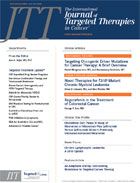RAS Mutation Testing Essential for Panitumumab in CRC
The presence or absence of RAS mutations should dictate use of panitumumab in combination with FOLFOX chemotherapy for patients with metastatic colorectal cancer.
Kelly Oliner, PhD
The presence or absence ofRASmutations should dictate use of panitumumab in combination with FOLFOX chemotherapy for patients with metastatic colorectal cancer (mCRC), two analyses of phase III data demonstrated. The analyses were presented at the 2013 American Society of Clinical Oncology (ASCO) Annual Meeting.1,2
Patients whose tumors had wild-typeRASlived almost 6 months longer when they received the anti-EGFR antibody panitumumab in addition to four cycles of FOLFOX. Tumors withRASmutations were associated with significantly worse progression-free survival (PFS) and overall survival (OS) with panitumumab.
Even among patients with wild-type exon 2, a subgroup had mutations in otherRASexons, which was associated with significantly worse survival with panitumumab plus FOLFOX4 versus FOLFOX4 alone.
“These results suggest thatRASmutation status beyondKRASmay be predictive of negative outcomes in patients receiving panitumumab plus FOLFOX4 in metastatic colorectal cancer,” concluded Kelly Oliner, PhD, principal scientist for in vitro diagnostics at Amgen, and colleagues, in a poster presentation at ASCO 2013.
“Panitumumab plus oxaliplatin-containing regimens should not be used in patients with mutantRASmetastatic colorectal cancer tumors,” they added. “By excluding patients with mutantRASmetastatic colorectal tumors, the benefit-risk profile of panitumumab plus FOLFOX4 is improved.”
A second analysis of the phase III study also showed significant improvement in OS among patients with wildtypeKRASexon 2 mCRC treated with panitumumab plus FOLFOX4, and confirmed the inferior survival in patients with mutantKRASexon 2.
Both analyses involved data from the PRIME randomized trial of FOLFOX4 plus panitumumab versus FOLFOX4 alone as first-line therapy for mCRC. As previously reported, the primary results showed a statistically significant 1.6-month improvement in PFS in the panitumumab arm and a trend toward improved OS in patients with wild-typeKRASexon 2 tumors. Patients withKRAS-mutant tumors had worse PFS and OS.3
A phase III trial of panitumumab monotherapy in mCRC also suggested lack of efficacy for anti-EGFR therapy in patients with mCRC tumors harboring mutations inKRASorNRAS.
Oliner and colleagues presented findings from a prospectively defined retrospective comprehensive biomarker analysis, includingKRAS,NRAS, andBRAF. The primary objective was to evaluate the efficacy and safety of panitumumab in patients with mutant and wild-type tumors.
The PRIME trial involved 1083 patients. Mutation ascertainment was 90% forRASin both treatment arms, 52% forBRAF, and 89% forRAS/BRAF. Oliner reported that 325 patients in the panitumumab arm had wild-typeKRASexon 2 (codons 12/13), as did 331 in the control arm. Additionally, 221 patients in the panitumumab arm had mutant tumors, as well as 219 in the control group.
Testing for otherRASmutations and forBRAFmutations showed that 108 (17%) wild-typeKRASexon 2 tumors had other mutations, most commonlyBRAFexon 15 codon 600 (9%), followed byKRASexon 4 (6%),KRASexon 3 (4%),NRASexon 3 (4%), andNRASexon 2 (3%).
Patients with anyRASmutation or aBRAFmutation had worse PFS and worse OS with panitumumab. In contrast, wild-typeKRASexon 2 tumors were associated with a 5.8-month improvement in OS among patients who received panitumumab in addition to FOLFOX4 (HR = 0.78; 95% CI, 0.62- 0.99;P=.043).
The second analysis of PRIME results involved the most mature OS data reported to date. Previous analyses occurred after 54% and 68% of survival events had occurred. The updated analysis reflected 82% of patients with a survival event, reported Jean-Yves Douillard, MD, PhD, director of clinical and translational research at the Integrated Oncology Centers in Saint-Herblain, France.
The exploratory analysis showed a median OS of 23.8 months in patients with wild-typeKRASexon 2 tumors treated with panitumumab versus 19.4 months in patients treated with FOLFOX4 alone (HR = 0.83;P=.03). Consistent with previous analyses, the data showed a trend toward worse survival with panitumumab in patients with mutantKRASexon 2 tumors (15.5 vs 19.2 months; HR = 1.16;P=.16).
References
- Oliner KS, Douillard J-Y, Siena S, et al. Analysis of KRAS/NRAS and BRAF mutations in the phase III PRIME study of panitumumab (pmab) plus FOLFOX versus FOLFOX as first-line treatment (tx) for metastatic colorectal cancer (mCRC).J Clin Oncol. 2013;31(suppl; abstr 3511).
- Douillard J-Y, Siena S, Tabernero J, et al. Overall survival (OS) analysis from PRIME: randomized phase III study of panitumumab (pmab) with FOLFOX4 for first-line metastatic colorectal cancer (mCRC).J Clin Oncol. 2013;31(suppl; abstr 3620).
- Douillard J-Y, Siena S, Cassidy J, et al. Randomized, phase III trial of panitumumab with infusional fluorouracil, leucovorin, and oxaliplatin (FOLFOX4) versus FOLFOX 4 alone as first-line treatment in patients with previously untreated metastatic colorectal cancer: the PRIME study.J Clin Oncol. 2010;28(31):4697-4705.
